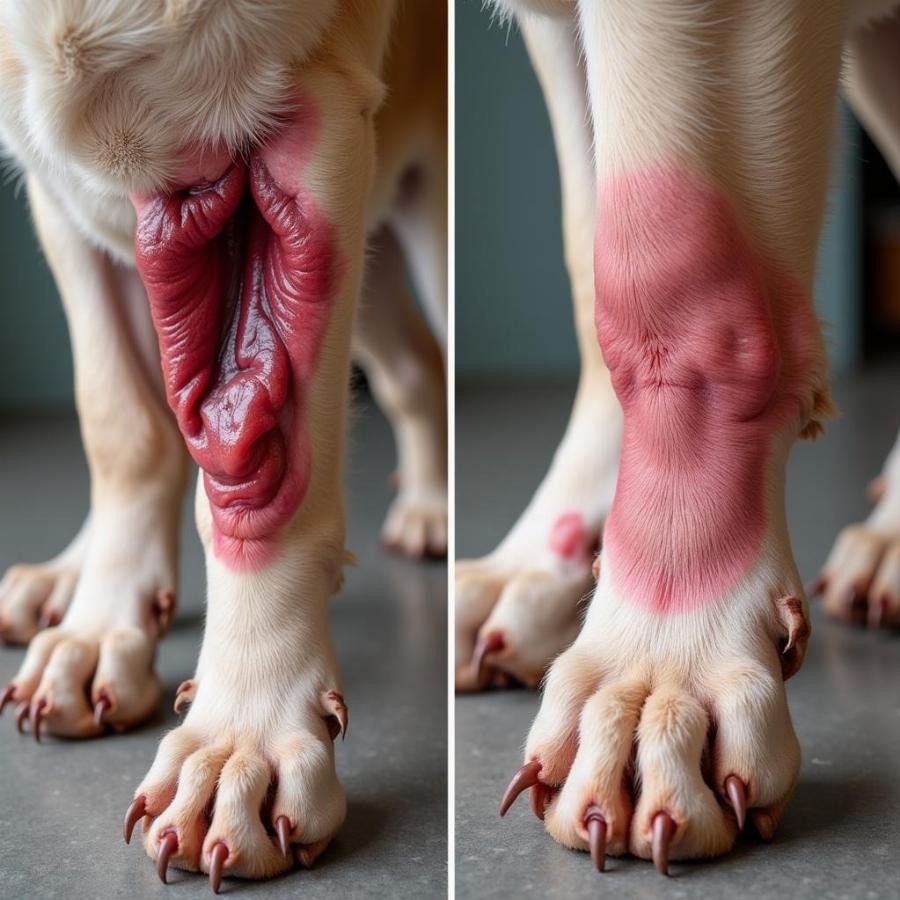Pulmonary fibrosis and rheumatoid arthritis are two serious conditions that can significantly impact a dog’s quality of life. While distinct diseases, both involve chronic inflammation and can cause pain, discomfort, and reduced mobility. Understanding the treatments for pulmonary fibrosis and rheumatoid arthritis in dogs is crucial for pet owners facing these challenges. This article will explore the available options and offer guidance on managing these conditions.
Understanding Pulmonary Fibrosis in Dogs
Pulmonary fibrosis is a progressive lung disease characterized by scarring and thickening of lung tissue. This scarring makes it difficult for the lungs to expand and contract properly, leading to breathing difficulties. Symptoms can include coughing, rapid breathing, exercise intolerance, and bluish gums. Unfortunately, there is no cure for pulmonary fibrosis, but treatments focus on managing symptoms and slowing the disease’s progression.
Managing Pulmonary Fibrosis Symptoms
Treatment for pulmonary fibrosis often involves medications like corticosteroids to reduce inflammation and bronchodilators to open up the airways. Supplemental oxygen therapy can help alleviate breathing difficulties, especially in advanced cases. Managing any underlying infections is also critical. Lifestyle changes, such as avoiding environmental irritants like smoke and dust, can also improve a dog’s comfort.
Rheumatoid Arthritis in Dogs: Diagnosis and Treatment
Rheumatoid arthritis is an autoimmune disease where the body’s immune system mistakenly attacks the joints, causing inflammation, pain, and stiffness. In dogs, it typically affects multiple joints, often symmetrically on both sides of the body. Symptoms can include lameness, swelling, decreased activity, and difficulty rising.
Diagnosis of Canine Rheumatoid Arthritis
Diagnosing rheumatoid arthritis requires a combination of physical examination, blood tests, and imaging studies like X-rays. Blood tests can detect the presence of rheumatoid factor, an antibody often associated with the disease. X-rays can reveal joint damage and rule out other conditions.
 Inflamed Joint in a Dog with Rheumatoid Arthritis
Inflamed Joint in a Dog with Rheumatoid Arthritis
Treatment Options for Canine Rheumatoid Arthritis
Treatment for rheumatoid arthritis in dogs aims to reduce pain and inflammation and improve joint function. Nonsteroidal anti-inflammatory drugs (NSAIDs) are commonly used to manage pain and inflammation. Disease-modifying antirheumatic drugs (DMARDs) can help slow the progression of the disease and reduce joint damage. Physical therapy, including exercises and range-of-motion activities, can help maintain joint mobility and muscle strength.
How Can I Help My Dog with Pulmonary Fibrosis or Rheumatoid Arthritis?
What if my dog has both pulmonary fibrosis and rheumatoid arthritis? Managing both conditions simultaneously can be complex and requires careful coordination with your veterinarian. Treatment plans are individualized based on the severity of each condition and the dog’s overall health. Regular monitoring is crucial to adjust medications and therapies as needed.
Conclusion
Pulmonary fibrosis and rheumatoid arthritis are challenging conditions for dogs and their owners. While neither disease has a cure, various treatments can help manage symptoms, improve quality of life, and slow disease progression. Working closely with your veterinarian, you can develop a comprehensive treatment plan tailored to your dog’s specific needs. Early diagnosis and intervention are key to maximizing treatment effectiveness and ensuring your furry friend remains as comfortable and active as possible.
FAQ:
- Can pulmonary fibrosis in dogs be cured? Unfortunately, no. Treatment focuses on managing symptoms and slowing progression.
- Is rheumatoid arthritis painful for dogs? Yes, it can cause significant pain and discomfort.
- What are the common signs of rheumatoid arthritis in dogs? Lameness, swelling, decreased activity, and difficulty rising.
- How is pulmonary fibrosis diagnosed in dogs? Through a combination of physical examination, imaging studies, and sometimes lung biopsies.
- What are the long-term effects of these diseases? Both can lead to decreased mobility and quality of life.
- Are there any natural remedies for these conditions? While some supplements may be beneficial, always consult your veterinarian before using any alternative treatments.
- How can I support my dog emotionally during treatment? Provide a comfortable and supportive environment, maintain a regular routine, and offer plenty of love and attention.
Further Reading:
- Learn more about Canine Respiratory Health
- Understanding Joint Health in Dogs
- Senior Dog Care Tips
Beaut Dogs is your go-to resource for reliable, helpful, and in-depth information about the wonderful world of dogs. From breed characteristics and care needs to health and training advice, we’re here to support you every step of the way. When you need assistance, contact us at Email: [email protected] for detailed and accurate answers. Beaut Dogs will be happy to assist you. Visit https://beautdogs.com today to explore the fascinating world of dogs and discover how to care for them best!